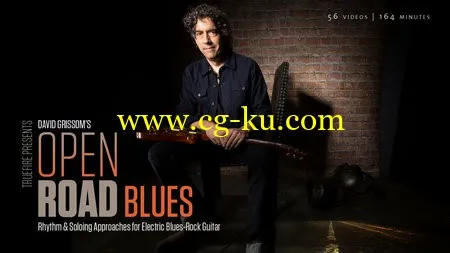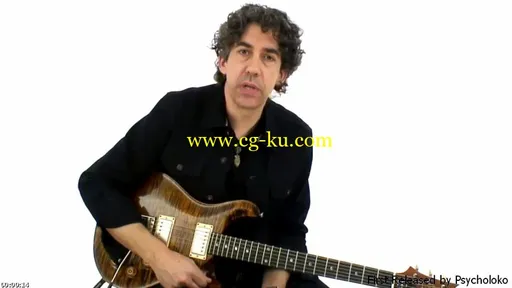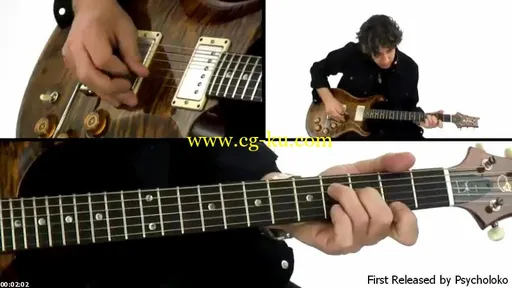
Truefire - Open Road Blues (2015)
MP4, data-dvd, ~700 kbps | 864x486, 30 fps | MP3, 44 kHz, 128 kbps | English | ~ 3 hours | 1.1 Gb
Open Road Blues is organized into 10 sets of performance and breakdown lessons. Each set of lessons features a rhythm track. For each track, David will demonstrate and then breakdown a variety of rhythm guitar parts and a variety of soloing approaches. Playalong with David’s performances as you’re learning the parts and then work with the rhythm tracks on your own to apply what you’ve learned.
All of the rhythm and soloing performances are tabbed and notated for your practice, reference and study purposes. You’ll also get Guitar Pro files so that you can loop and/or slow any section down as you work through the lessons. Plus, David also generously includes all of the rhythm tracks for you to work with on your own. Content:
STUDY 1: CROSSCUTTIN’
“12-bar Blues in A with a V-IV turnaround from E to D, based on Albert King’s Crosscut Saw. I’ll show you the way that he played it originally, playing a G triad over the chords to voice them in a unique way. I’ll then show you a unique approach for using a dotted eighth note delay to make it sound more ambient. We’ll experiment within the choruses and solo sections using several different styles.”STUDY 2: LISTENIN’ LUCKY
“An all-out, meat and potatoes, Rock-Blues feel. I’m going to take you through the rhythm and solo parts, showing you variations and options that we can use over three choruses. I’ll also show you how to perform the rhythm parts using different chord voicings over each chorus while maintaining the track’s feel.”
STUDY 3: SIXTY FIVE ELEVEN
This track is unique from other blues forms—it’s a Texas Blues Shuffle that differs in its turnaround, going from the vi to the V (instead of the typical V to IV that we see in blues). Like the other performances, I’ll switch it up each chorus during the rhythm and solo parts to show you the options you have when playing over this type of feel an progression.”
STUDY 4: TRAMPIN’ DOWN
“This 12-bar Blues in the key of B, is based on the Slim Harpo song, Te-Ni-Nee-Ni-Nu, which was redone by Lou Ann Barton and myself to sound like the song Tramp. I’ll show you a variety of rhythm and soloing approaches by taking a different approach on each chorus.”
STUDY 5: PROOF IN THE PUDDING
“This track was developed while I was playing on Buddy Guy’s records. This started as a very basic 12-bar blues in A without much variation. I’ve tried to ‘reinvent the wheel’ here, picking a new motif while maintaining the same blues feel. For the soloing, we’ll start in familiar territory and then finish with some country style chickin’ pickin’ double stops.”
STUDY 6: LONESOME AGAIN
“This track is based on my song, Lonesome Dave. It's a two-chord major blues in E with a 16 bar pattern using the E7+9 and B7+9 chords, both having a major and minor third in them (giving the track a minor flair at times). I'll take you through the head part of the track, and then we'll work through a variety of rhythm and soloing ideas.”
STUDY 7: DOVER SOUL
“A two-chord minor blues in D minor. I’ll take you through the head and also give you several rhythm and soloing options for playing over the track. In the rhythm section, we’ll work with higher voicings and ambient chords not normally associated with blues shuffle playing. In the soloing section, we’ll use the Aeolian mode.”
STUDY 8: SQWAWKIN’
“Named after my song, Sqwawk, we’ll run through the head, rhythm and solo parts showing you variations that you can use over each chorus. In the rhythm part, we’ll add a Pete Townsend and Keith Richards style melody. The solo section keeps the spirit of the song alive—staying raw and aggressive while introducing the MIxolydian mode and descending double-stops.”
STUDY 9: ROCKIN’ BERRIES
“This track has a Chuck Berry feel. For the rhythm section of this song, we’ll start with a Chuck Berry inspired sound, moving to a more R&B feel using 9th chords, and then close it using a Lonnie Mack style riff. The soloing takes thematic elements from the rhythm section and applies them over a Blues Scale, adding in rakes and double-stops without getting too complicated.”
STUDY 10: GOOD DAY FOR THE BLUES
“This is a blues-rock song that I wrote many years back with my band Storyville. We’ll work through the intro and first verse, and I’ll show you how to play the parts correctly using a capo and make it sound authentic. We’ll also work through a variety of rhythmic approaches.”

